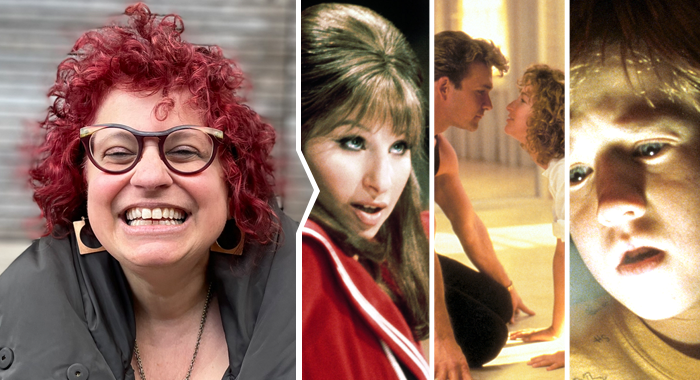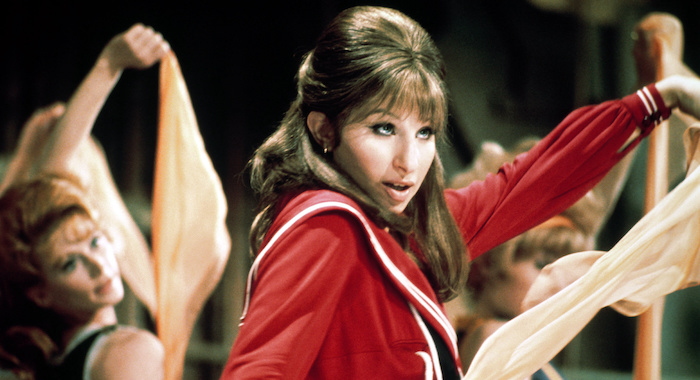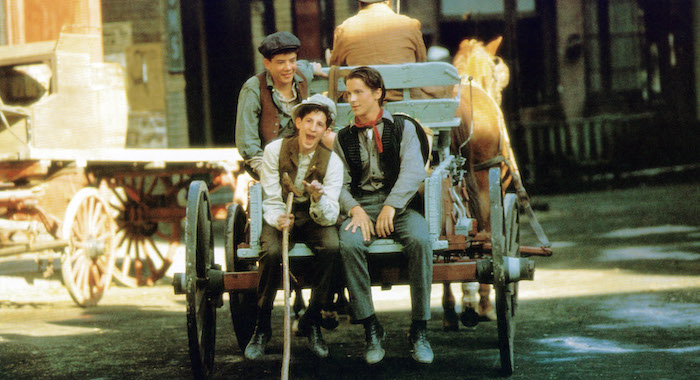
(Photo by © Buena Vista Pictures / courtesy Everett Collection, © Columbia Pictures / courtesy Everett Collection, © Artisan Entertainment/ courtesy Everett Collection)
“Know Your Critic” is a column in which we interview Tomatometer-approved critics about their screening and reviewing habits, pet peeves, and personal favorites.
In speaking with Max Weiss about movies, culture, and her career, it becomes clear that she was destined to become a critic. She predicted movie endings and evaluated their plotlines as a kid; as a result, her critical style is conversational and deeply analytical. In addition to currently being a critic and Editor-in-Chief for Baltimore Magazine, she’s reviewed movies on broadcast TV and radio and written for New York Magazine.
But early in her life, Weiss thought being a writer meant being a novelist.
“I think that most young people who love to write, they think they want to write fiction,” Weiss said in an interview with Rotten Tomatoes. “Even though I actually have this super analytical mind, and I also have this complete love of popular culture, I just thought, Well, I love to write, so I’ll be a fiction writer.”
In college, a mentor guided her toward a different approach: “I had a teacher who very gently said to me, ‘Max, you’re a great writer, but you are not a great fiction writer.’ He was right!”
“Sometimes somebody can give you advice like that, and that’s a story: 20 years later… it’s like, ‘Aha, I proved you wrong!’,” she laughed. “But this wasn’t that. This was more like, You know what? He’s 100% right.”
Weiss quite simply loves writing and loves movies. And like many film fans, she wants to share the titles that excite her to facilitate conversations and think deeply about them.
Criticism, for Weiss, is “an art form in its own right.”
“I’ve always had such a passion for pop culture, for film, for television. Just really love to consume pop culture,” Weiss shared. “I thought, Oh, my God. I could combine my two loves into this one thing. That’s how I found film criticism.”
Max Weiss is Editor-in-Chief at Baltimore Magazine and a film and pop culture critic. Find Max on Twitter: @maxthegirl.
What is your favorite film from your childhood?
E.T. – although I will say that, even as a child watching E.T., I was sophisticated enough to know that E.T. wasn’t going to die. There’s a point in the film, with about maybe 45 minutes to go, when you think maybe E.T. has died. Little pint-sized Max was like, “He’s not dead. There’s still an hour of the film to go.” I was sophisticated enough even then.
What a magical experience that movie is. There’s just something about Spielberg and the kind of magic that he’s been able to accomplish. It’s why we go to the movies, that just sort of wonderful, shimmering suspension, beauty mixed with humor, pathos, excitement.
What is your favorite memory of watching something in a theater?
The Sixth Sense… First of all, it’s a very captivating film. It remains M. Night Shyamalan‘s best film. When the twist came through – the audible gasp in the audience, none of us saw it coming!
It was such a great experience to see that film going in blind. Who is this young filmmaker? Why is Bruce Willis involved in this project? Oh, my God. Look at this amazing child actor!
Do you usually go in cold when you’re reviewing something?
I’m a “read the back page of the book jacket” kind of person. I’m a “watch the trailer” kind of person. Maybe it’s because I’m a control freak – I like to have some sense of what I’m getting myself into as opposed to just completely succumbing to the experience.
What has been your favorite release that you’ve seen this year so far?
A documentary called Fire of Love. It’s about these two volcanologists who fell in love. It’s an amazing character study. It’s terrifying and awesome and reminds you about the beautiful terror of nature.
But, as I put in my review, what the film really does best is it made me believe in soulmates for the first time, because this couple! How is it that they found each other?! They were two volcano obsessives who found each other, and they went around exploring volcanoes together. They never had kids. The volcanoes were their children. It’s an incredible love story on top of everything else. It’s remarkable. Really, one of the best documentaries I’ve seen in a long time.

(Photo by Paramount Pictures)
What, for you, makes a “good movie”?
For the most part, it’s if the film does what it sets out to do. I’m always really mindful of that.
I try to meet the film on its own terms. If it just wants to be a silly comedy, is it an effective silly comedy? If it wants to be polemic, is it an effective polemic? If it wants to be a mystery, et cetera. Then, sometimes in my review, I will say, “This isn’t my kind of film, but it’s really good at what it does.”
However, the best films, I always say, are the kind where, even if you think to yourself, “I’m not that into science fiction,” the film transcends genre and is so good that I will say, “Even if you think you don’t like science fiction, you’re going to like this film.”
Arrival is one that just pops into my head, where it’s so beautifully shot, beautifully acted, compelling on so many levels that you don’t have to be a sci-fi buff to get swept away by a movie like that.
What is the hardest review that you’ve ever written?
Hardest? I can’t think of a specific film, but there’s two kinds of reviews that are very tricky.
One is when you’re reviewing a film that is very much in line with you politically, and you don’t want to make the review political or alienate the reader that may not share your political point of view. I’m thinking way back to early films, Michael Moore-type films and stuff like that, where I used to review them on the radio, and I didn’t want to alienate part of my listenership.
The other thing that can be tricky is when a film is so well-intentioned, and they’re trying so hard, and it’s just no good. You feel like an asshole for giving it a bad review!
Are there fellow critics whose work you regularly seek out, or is there someone whose work you read early in your career that led you towards the style that you have?
Well, yes! Obviously, like everybody else, I read a lot of Pauline Kael when I was a kid. I watched Siskel and Ebert. They were probably the most important. I also read David Denby, who was the other critic at The New Yorker. He doesn’t get as much love, but to me, growing up, I read him rather religiously.
There’s tons of critics today that I love. I love Dana Stevens from Slate. I love Stephanie Zacharek from TIME. Richard Brody, of course, from The New Yorker. I like David Ehrlich from IndieWire. I think he’s got a really nice voice. He’s got a mensch-y vibe going in his writing.
I like the film-critic-as-mensch vibe.
What do you think is the biggest misconception that people have about critics?
That we don’t want to like films or that we get off on not liking films! Critics generally go into films filled with hope, and sometimes that hope is dashed. But our favorite thing is to champion a film, especially a little seen film or a potentially little seen film.
There is this perception that critics get off on being vicious, or we want to impress people with our erudition, and therefore, we just can’t relate to the normal moviegoer. Film critics love movies! That’s why we do what we do.

(Photo by Columbia Pictures, Courtesy Everett Collection)
What were you watching the first time you saw yourself onscreen, and what did you relate to about that character or story?
Well, this is somewhat awkward now, with what has been going on with him and his reputation, but it was probably Woody Allen. I mean, he was a man. I’m a woman. But to see this Jewish, neurotic, New York – I grew up on Long Island, so New York-adjacent – guy… There was something about his particular brand of neuroticism that appealed to me.
Then I guess literally every Jewish woman that you talk to is going to say Barbra Streisand. Watching The Way We Were and Funny Girl, films like that, it was like, “Oh, my God. She’s got a big nose, and she’s the romantic lead.”
I would say both Woody Allen and Barbra Streisand. I’m not even a religious person or somebody who needs to seek out Jewish people on screen – it’s weird that they’re both Jewish. But those were the two that I, as a kid, probably gravitated to the most and found most relatable. … When it comes to Judaism, I mean, it is like a culture. It’s an essence. I mean, I’m literally a nonbeliever, so it has nothing to do with the religion, per se.
I would love to ask you about how you wrestle with your connection to Woody Allen’s characters, because that can be a complex experience.
Yes. Totally.
How do you wrestle with that?
Well, I interrogate myself a lot when it comes to Woody Allen.
Ronan Farrow said once in a documentary that, for some people, the accusations against Woody Allen almost pose an existential threat. I thought, That is so right on for me, because what he means is there are people who formed part of their identity based on loving these films. I would say that’s me to a certain extent.
I went back and rewatched Manhattan, which was a film that I loved. I mean, it was kind of cringe. I wasn’t able to have the relationship I used to have with it. I think that happens to be true a lot. You go back and you watch a film, and just because of what the cultural mores were at the time, the film seems dated or has a little bit of an ick factor. There certainly are things about Manhattan that I still love. It’s gorgeously shot. It has an excellent Wally Shawn joke that I will never not love. There’s a lot that I love about it. Annie Hall, too.
I tend to be a person who says, “Separate the art from the artist,” although I think that tends to happen more after the artist is no longer alive. When he’s alive, it’s a little trickier. When he’s doing films where he is a middle-aged dude having an affair with a schoolgirl, it becomes that much trickier.
This is something that I have had to really grapple with a lot because he really was important to me. The accusations against him and the sort of perception of him, Ronan is right, they do pose an existential threat to me.

(Photo by © Buena Vista Pictures / courtesy Everett Collection)
What is your favorite classic film?
I very much love The Graduate. I really love Mike Nichols.
I love Chinatown a lot.
I love Godfather One and Godfather Two. Depending on my mood, I’ll go back and forth as to which is the better film. They’re both just stone cold masterpieces.
Jaws! I mean, you want to put Jaws in there. It’s not black and white, but it is a classic film in its own way. I just love that. Bonnie and Clyde.
I also really love The Apartment with Billy Wilder. Fantastic. Fantastic!
What is your favorite thing that’s Rotten on the Tomatometer?
I’m sort of embarrassed, but I would say Newsies.
Yes!
Right? Thank you. Newsies is really f–king great. It’s annoying that it got such terrible reviews because it’s just banger after banger. You have young, beautiful Christian Bale dancing and letting loose. Honestly, it’s an extremely charming, well-choreographed film. But, in particular, it has some great songs. Not all the songs are great, but it has lots of songs and cute boys with smudged faces saying, “Get your papes.” I’m a fan of Newsies.
Who are the three folks that you think everyone should follow on Twitter?
Well, okay. I would say follow Female Film Critics (@FemaleCritics), which is the account run by my friend Diana Drumm. She aggregates a lot of tweets from female film critics and reviews. That’s one that I would really say to follow.
I love Emily Nussbaum (@emilynussbaum). Major girl crush on her. I think that she is, to me, the perfect blend of erudition and wit and warmth in her writing, and her Twitter account is actually very funny.
What is the movie or show that you have watched more than any other?
Buffy the Vampire Slayer is the show without a doubt. Here’s another problematic male. I’m drawn to the problematic male.
In terms of movies – gosh, they’re all embarrassing. They’re all comfort-type films, like Pretty in Pink, Dirty Dancing. At one point, I was thinking I would start a podcast about reclaiming some of those titles that get dismissed as women’s films or girls’ films, and taking them back and acknowledging that they do have an intrinsic value and a power.
But yeah, I probably have watched Pretty in Pink more than any other film. Molly Ringwald for life.
Ah, yes. I love her. And Dirty Dancing!
I would say that is the answer that so many people give. That’s really an interesting question: What is it about that film that not only do people love, because it’s lovable, but that people feel like, “Oh, it’s on? I’m going to watch it.”? It’s absolute comfort food in film form. …
One thing that always works in film – I mean, it’s definitely a manipulative tactic – is when there’s somebody who has been underestimated who triumphs. That’s why Good Will Hunting is so satisfying to watch, because they think he’s just the janitor, and then he turns out to be smarter than them all. It’s like, “Yeah!”
It’s the same with Dirty Dancing and Johnny. They think that he’s this no-good guy. He turns out to be this incredibly heroic guy! As far as Baby is concerned, people think that she’s not a woman in control of her own sexuality or desirable. She proves otherwise in that.
Maybe that’s it: It’s a two-in-one film of somebody proving the doubters and the haters wrong. As a viewer, that experience, when it’s done well, as certainly is the case in Dirty Dancing and Good Will Hunting, it can be very satisfying.
Max Weiss is Editor-in-Chief at Baltimore Magazine and a film and pop culture critic. Find Max on Twitter: @maxthegirl.